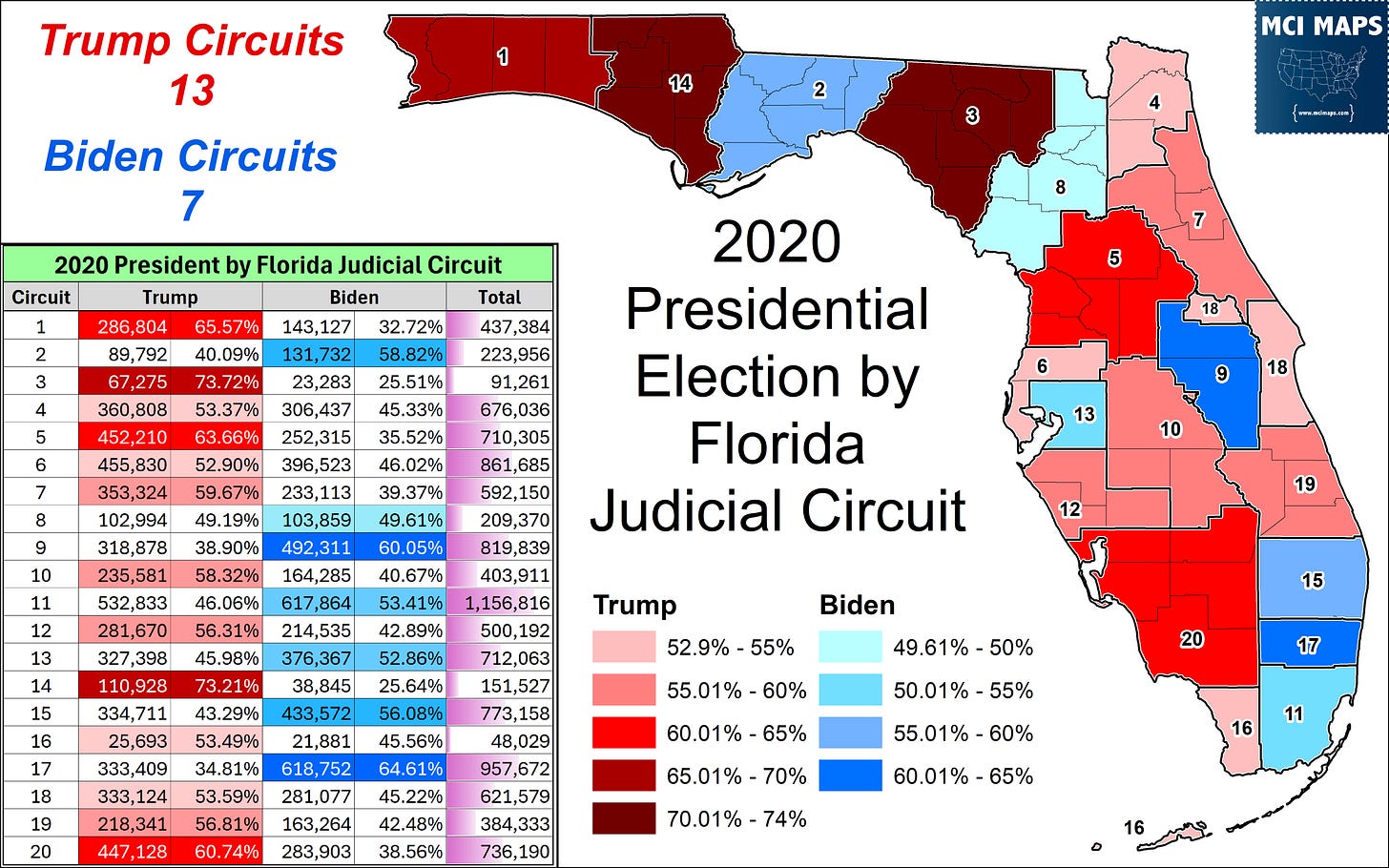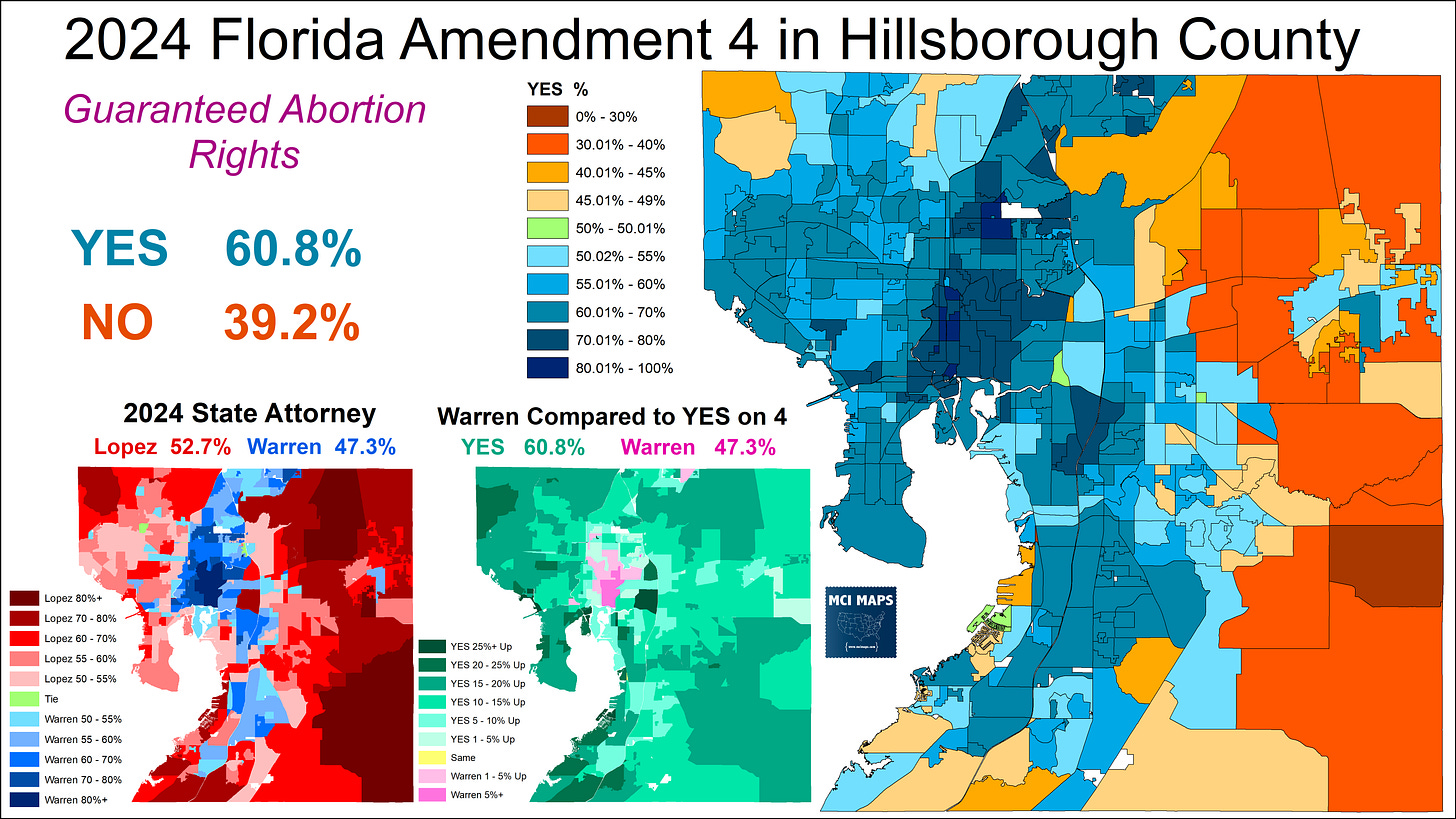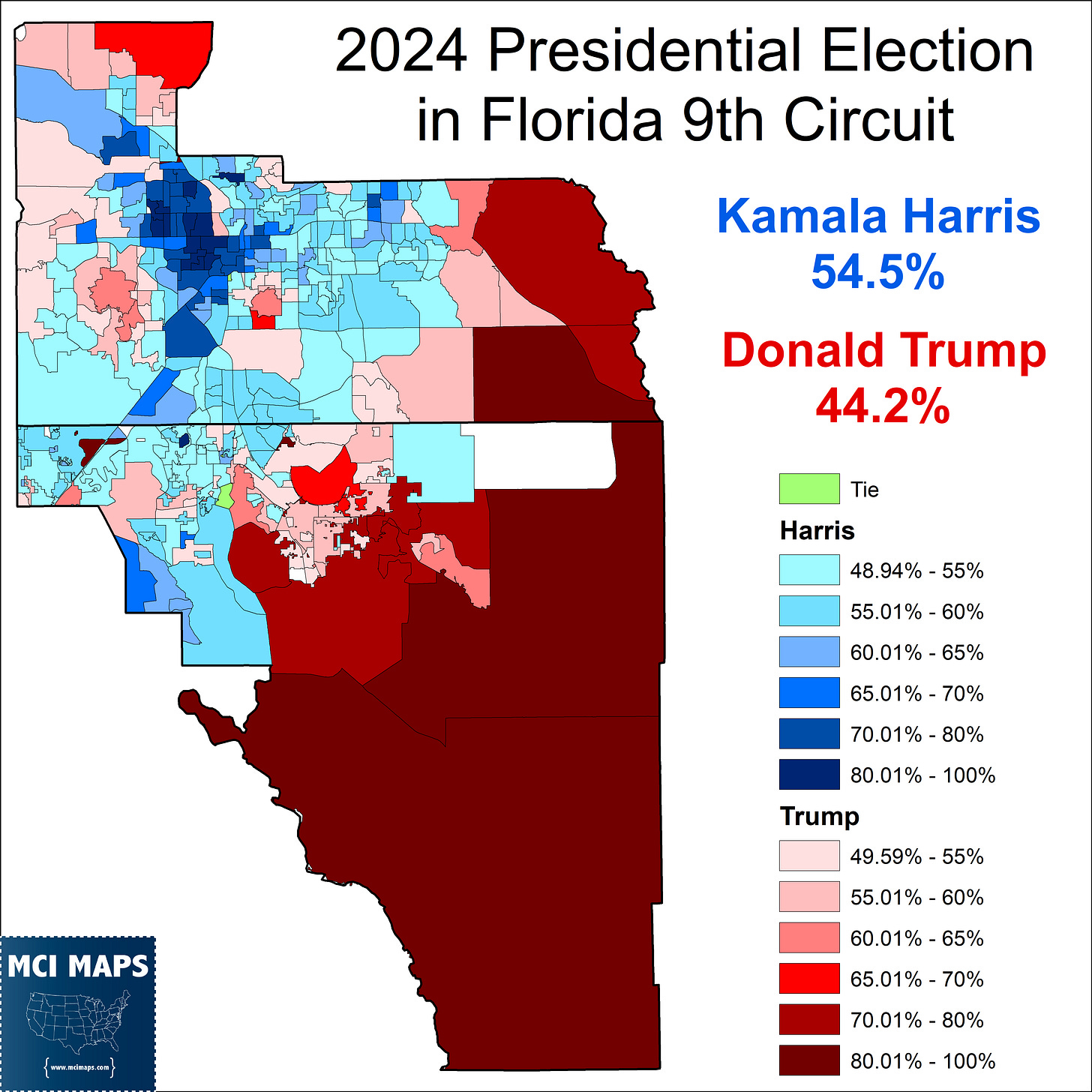Issue #213: How the State Attorneys DeSantis Suspended did on Nov 5th
Warren and Worrell ran to get their jobs back
As many political observers watched Florida on election night, the focus was not so much on President, but rather on a litany of regional and local races. Two of the most high-profile local contests were the elections for State Attorney in the 9th and 13th Judicial circuits. In these circuits, Ron DeSantis had suspended Democratic prosecutors for a variety of nonsensical reasons, and both suspended officials were running to take their jobs back.
This article will look at how their races went.
Background
I covered the story of both of these races in previous writings, but I want to offer a summary background for those less familiar.
Florida is divided into 20 Judicial Circuits. The circuits do not follow population figures, but rather focus on ease of access for the communities. The layout of the the circuits, and how they voted in the 2020 Presidential election, can be seen below.
Each of the 20 circuits elect a State Attorney and a Public Defender. In addition, several judges are elected for the circuits. The SA and PD are both elected on partisan ballots; with modern party ID of said officials often matching the partisan lean of the circuit - though that didn’t always used to be the case.
After the 2020 elections, the 9th circuit had Democrat Monique Worrell, who was elected on a reform-minded platform. The circuit in question covers Orange and Osceola Counties.
Over in the 13th Circuit, which is just Hillsborough County, Incumbent Andrew Warren was re-elected with 53% of the vote in the 2020 election.
Warren was initially elected in 2016; knocking off the Republican incumbent at the time.
In Florida, the Governor has broad powers to suspend elected officials. This suspension power often is used for when a local official is charged with a crime or under a credible investigation. The usual story has been “commission X is indicted for bribery, Governor suspends official.” Suspensions can then be lifted if the official is acquitted.
The suspension power took on a disturbing political posture under Ron DeSantis, who has suspended multiple officials for vague reasons. While most suspensions remain normal, hitting folks charged with crimes, DeSantis has several that fall more under political disputes. I documented many of these cases in the article below.
In August of 2022, DeSantis announced he was suspending Andrew Warren as State Attorney. His reasoning was Warren signing a pledge that he wouldn’t prosecute women or doctors over the state’s abortion restrictions post-Dobbs. Warren argued that the law gives him discretion, and that the suspension also came amid statements he made, not any direct case actions his office had taken. Warren challenged the suspension in federal court, with a trial judge saying Warren’s free speech had been violated but that he did not have the power to re-instate him.
Then in August of 2023, as DeSantis’ Presidential campaign began to really lag behind Donald Trump, the Governor announced he was suspending Monique Worrell from the 9th circuit. This suspension had even less validity than the Warren case. Here DeSantis suspended Worrell for claims she was not tough enough on crimes. The decision came amid an ongoing feud between Worrell and the Orange and Osceola Sheriff departments. I delved into full details on the suspensions and drama in the district here. Long story short - she was right and both Sheriffs are DINOs.
Worrell’s suspension was seen by most as a clear effort by DeSantis to re-energize his campaign for President. It wouldn’t work, with DeSantis failing in Iowa and dropping out in January of 2024.
The November 2024 elections would see both Warren and Worrell make bids to take their offices back. Lets see how they went.
Warren’s Effort in the 13th
Lets start with the candidate first suspended - Andrew Warren. Initially it was suspected Warren had a strong chance to win his post back. Hillsborough County has usually leaned Democratic in Presidential years; and even most midterms. His opponent would be DeSantis appointee Suzy Lopez. As long as Democrats remained united, and with abortion rights certainty popular in the county, Warren could win back his post.
However, what caught Warren and many other Democrats flat-footed was Hillsborough County voting for Donald Trump by 3%.
The flip of Hillsborough from being Biden +7 to Trump +3 was due to several scenarios.
A swing of the Hispanic community, which covers western Hillsborough, to Republicans.
Lagging Democratic registration in recent years; leading Democrats only holding a 5,000 vote lead out of 860,000 voters.
Bad turnout - with Republicans maintaining a 7% turnout lead; allowing them to cast 17,000 more ballots than Democrats; meaning Democrats would likely have needed to with NPAs by 10% to win races. That didn’t happen.
Far more will need to be investigated regarding Hillsborough’s big swing, but those are definitely some key factors. The Hillsborough Democratic Party chair has subsequently said they are stepping down.
With the Trump win there, so did several other Republican candidates. The Clerk of Court office flipped to the GOP, as did the at-large county commission district. As for the State Attorney race, Warren lost by 5% to Lopez.
Warren was unable to achieve a strong base beyond regular Democratic support. He did worse than Harris in most of the county, outperforming in only a few precincts. Voters, who have had Lopez as their State Attorney for two years now, may have seen no big reason to change things up again. The only two Democrats to win county-wide this year were the incumbent Elections Supervisor and Incumbent Property Appraiser; and both those races were closer than they should have been.
Warren’s loss shouldn’t be looked at as voters supporting the reason for his suspension. After all, Hillsborough County gave Amendment 4, which would have codified abortion rights up to viability, 61% of the vote. Warren underperformed Amendment 4 everywhere except the Black community.
This is probably the best example of the ticket-splitting nature of voters. Many people casting ballots clearly support abortion rights, and maybe were fine with Warren’s original position. However, these voters also largely wanted Republicans to control other offices; even though the party is decidedly anti-choice.
This isn’t a new phenomenon among voters; this just being the latest example.
Worrell in the 9th Circuit
Over in the 9th circuit, it was not a good night for Ron DeSantis. Monique Worrell easily won back her post, ousting appointed incumbent Andrew Bain, who ran as an independent. Bain, who like Worrell is Black, originally filed to run as a Republican but switched to NPA to have a chance at winning what is otherwise a blue circuit.
Worrell and Bain were initially meant to have a Republican opponent as well. However, the Republican nominee, Seth Hyman, dropped out of the race after winning the August primary. I covered this saga in Issue 196 - DeSantis meddling. Hyman specifically sited the risk of a split vote in his decision.
In order to give this community the best chance of not seeing a second term for Monique Worrell, I have decided to withdraw from the State Attorney’s race and will not appear on the General Election ballot. I do not want the anti-Worrell vote to be split, and I am willing to make this major sacrifice to further that purpose.”
In my issue from that time, I discussed how there was major speculation that Hyman always ran with the intention of dropping out. His Republican opponent in the primary, Thomas Feiter, said as much. In the end, however, it did not matter, with Worrell winning by 15%.
The circuit as a whole voted for Harris by 10% that same day.
The biggest difference between the candidates was that Worrell won both Orange and Osceola. Harris losing Osceola County, which I discussed in an article last week, was a major shift in the region. However, Orange County remained firmly blue.
How Worrell and Harris compared can be seen below. Worrell did better Hispanic voters while Harris was stronger in the Black community. Harris and Worrell did better than the other in some of Orange County’s different whiter suburbs.
Of course one fact in this race was ballots left blank. In total 60,000 people didn’t mark the race at all. Worrell secured 413,000 votes; which was actually 11,000 less than Harris. However, Bain’s 305,000 was well below Trump’s 344,000. For Bain, running an NPA had plusses and minuses. He clearly could not have won as a Republican; not with Trump easily losing the circuit. However, he also likely lost Republican votes who didn’t know he was the GOP-aligned candidate.
That said, Worrell also had some Trump voters backing her, especially in the Hispanic community. It is notable that in Osceola County; she got 4,000 more votes than Harris. This matches with how other local democrats performed in Osceola, which I covered last week.
Looking Ahead
DeSantis had one victory and one loss on this front. Both were largely products of the national winds within the respective circuits.
The question now is what DeSantis will do in the 9th Circuit. Many of wondered if Worrell will be re-suspended at some point once she takes office. DeSantis’ moves last time were focused on aiding his Presidential profile. He still wants to be President, and he clearly has no respect for the rule of law. However, it doesn’t mean a fresh suspension for sure will happen.
Regardless of the future, this whole saga has shown this Governor suspension process is far too broad and powerful. While one would hope an effort to reign it in would come from lawmakers; I think history has shown waiting for those folks to grow a spine is a long process indeed.














